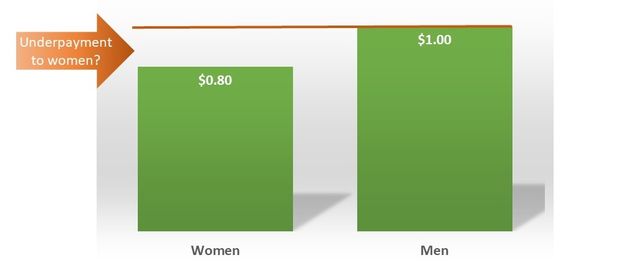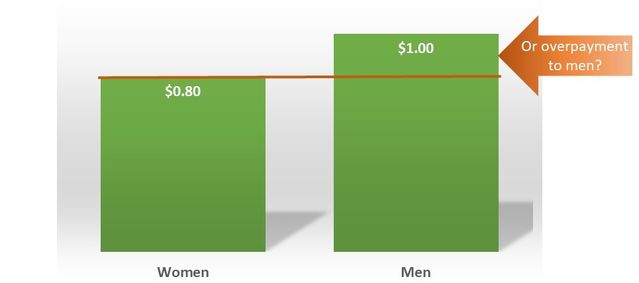
Women, you’ve heard, make about 80 cents for every dollar earned by men. The number varies depending on who’s doing the math, but the idea is the same—if women’s wages are ever going to be on par with men’s, women have a lot of catching up to do.

But what if we’re thinking about it all wrong?
Imagine a woman who earns $80,000 per year and a comparably qualified man who brings home $100,000. Many of us might call her underpaid. But could thinking of him as overpaid make more sense? We’ve been assuming that a man’s wage is the gold standard against which others should be compared. But perhaps her salary—not his—is where we should be setting our mark.
When people think about salaries, most agree that merit should be primary. Those who work harder, produce more, or bring more to the table should, in fairness, earn more money. But when people evaluate their own salaries and decide what they should be paid, they don’t always follow that rule.
That especially seems to be the case for men. In one study testing this idea, men and women were asked to do a difficult task, then pay themselves according to what they thought they deserved. The researchers found that women based their pay on how well they’d performed. Makes sense: the more merit, the more pay.
But the men? Men based their pay not on their performance, but on their self-esteem. Men who thought they were good people thought they should be paid more—regardless of their work quality. They also paid themselves about twice as much overall.
Stepping back, this isn’t so surprising. Plenty of research confirms how central pay is to men’s self-concept. Many men feel that the endless pursuit of status markers like high salaries is a necessary part of being a “real man.” So men who are feeling the pressure of traditional gender roles may insist on high pay not only because of their qualifications or their job performance, but also to reinforce their sense of worth as men.
Using that lens, let’s look back at the $100,000 earned by our example male employee. I’d guess that $80,000 of that salary—the amount earned by his female colleague—can be easily justified. He’s experienced, he works hard, he brings clear value to his organization. That’s merit-based pay in action.
And the remaining $20,000?
I think there’s a good chance that some of this extra amount is due to squishier factors. Maybe luck and timing—but also ego, aggressive negotiations, and the pressures wrought by gender-related expectations. Are those the criteria by which we want to compensate people in today’s organizations?

Let’s be clear. I am not suggesting that men start demanding massive pay cuts in the interest of fairness. Nor am I implying that men don’t work hard or don’t deserve to be compensated for it. And of course, many workers, male and female, aren’t making anywhere near $100,000 to begin with.
Instead, before we seek a change in pay, I’m calling for a change in perspective.
Thinking about men as overpaid instead of women as underpaid reminds us that merit should be the core of compensation. It also points to different solutions for the gender gap in wages. The old way puts the burden on women. The message is that women should be asking for more, negotiating harder, and continually self-advocating until the problem is fixed. Those strategies are important but exhausting.
The wage gap is not the fault of individual men and women, but likely stems from compensation systems that base new offers on past salaries, that grant raises to those who ask instead of those who demonstrate worth, that links the value of a man to the size of his paycheck.
Here’s what I predict: When organizations develop salary systems that more closely tie pay to work, the wage gap will shrink. In the meantime, we can all work on leaning in—or staying right where we are.
References
American Association of University Women (2018). The simple truth about the gender pay gap: Fall 2018 edition. Washington, D.C.
Good, G. E., & Wood, P. K. (1995). Male gender role conflict, depression, and help seeking: Do college men face double jeopardy? Journal of Counseling & Development, 74(1), 70-75.
Kim, J. Y., Fitzsimmons, G. M., & Kay, A. C. (2018). Lean In messages increase attributions of women’s responsibility for gender inequality. Journal of Personality and Social Psychology, 115(6), 974-1001.
Konrad, A. M., Ritchie, J. E., Jr., Lieb, P., & Corrigall, E. (2000). Sex differences and similarities in job attribute preferences: A meta-analysis. Psychological Bulletin, 126(4), 593-641.
Pelham, B.W., & Hetts, J. J. (2001). Underworked and overpaid: Elevated entitlement in men’s self pay. Journal of Experimental Social Psychology, 37, 93-103.
Williams, M. J., Paluck, E. L., & Spencer-Rodgers, J. (2010). The masculinity of money: Automatic stereotypes predict gender differences in salary estimates. Psychology of Women Quarterly, 34, 107-120.

